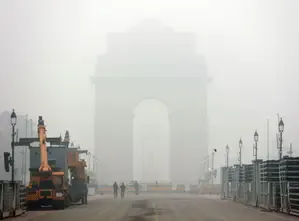Dense Fog Covers Delhi-NCR, Causing Flight and Train Disruptions Amidst Deteriorating Air Quality

Synopsis
Key Takeaways
- Dense fog disrupts transport in Delhi-NCR.
- Air quality index hits 'very poor' levels.
- Health risks are elevated for respiratory patients.
- Airport advises checking flight status due to fog.
- Weather forecasts predict continued fog and poor air quality.
New Delhi, Feb 1 (NationPress) The city of Delhi and its surrounding National Capital Region (NCR) were enveloped in thick fog on Saturday morning, resulting in nearly zero visibility on roadways and affecting daily life.
This dense fog has also severely impacted both air and rail traffic, with potential delays and cancellations anticipated due to the low visibility.
By 7 AM, the capital recorded a temperature of 11.2 degrees Celsius, while the Air Quality Index (AQI) stood at a concerning 353, placing the air quality in the 'very poor' category, as reported by the Sameer app.
In Noida, located in Uttar Pradesh, the AQI was recorded at 305, also in the 'very poor' category, whereas Ghaziabad showed 'poor' air quality.
In Gurugram, Haryana, the AQI reached 312, categorizing it as 'very poor,' while Faridabad reported a 'poor' AQI of 286.
The alarming air quality poses significant health risks, particularly for individuals with respiratory issues.
Indira Gandhi International Airport has issued an advisory indicating possible disruptions. An update on X stated, "While landings and take-offs continue at Delhi Airport, flights not CAT III compliant may be impacted. Passengers are encouraged to check with airlines for the latest flight information."
They further apologized for any inconvenience caused by the adverse weather conditions.
The India Meteorological Department (IMD) predicts that Saturday's minimum temperature will drop to 10 degrees Celsius, with a maximum expected around 26 degrees Celsius.
The IMD has also cautioned about persistent dense fog throughout the day, which may continue to affect visibility, especially during morning and late evening hours.
In a surprising weather shift, Delhi had a relatively warm January, with Friday's maximum temperature reaching 27 degrees Celsius, marking the warmest day of the month since 2019. However, despite the warmth, pollution levels have remained elevated.
Forecasts indicate that Delhi's air quality will remain in the 'very poor' category until February 3, after which slight improvements are anticipated.
Residents are urged to exercise caution, particularly those susceptible to the effects of pollution.








